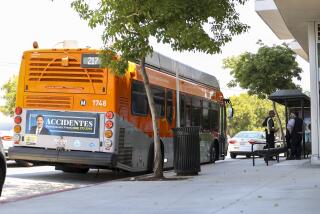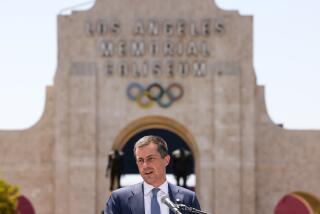Senate OKs transportation bill (with good news for L.A.)
In a rare display of bipartisanship, the Senate approved a $109-billion transportation bill Wednesday that boosts Los Angeles’ efforts to speed expansion of its bus and rail system and provides a pathway for Mayor Antonio Villaraigosa to fast-track projects.
The measure passed by a 74-22 margin, underscoring the political appeal of a bill that supporters say will create jobs and reduce traffic congestion.
The bill, possibly one of the few major pieces of legislation that could be signed into law before the fall election, maintains the current level of funding for highway and transit projects for two years.
“Maintaining a world-class infrastructure system is critical to creating an economy built to last,” a White House statement said. “Our country needs and deserves a commitment to surface transportation that will create jobs by rebuilding and modernizing our roads and bridges and allows us to compete and grow in the global economy.”
The bill would significantly expand a federal loan program critical to Villaraigosa’s efforts to build a dozen local transit projects in 10 years instead of the targeted 30. Among the projects he is seeking to accelerate are the subway extension to the Westside, a long-sought rail extension to Los Angeles International Airport, a downtown connection for rail lines and expansion of transit lines in the San Fernando and San Gabriel valleys.
The House, where Republican leaders have struggled to unify their majority behind a bill, still must act.
House leaders are considering bringing up “something like the Senate bill,’’ but are still “working toward coalescing around a longer-term approach with needed reforms,’’ said a spokesman for Speaker John A. Boehner (R-Ohio). Congress must act by the end of the month or face a shutdown in the federal highway program.
The Senate bill also would provide financial incentives to states that crack down on distracted driving, require ignition interlock devices for DUI offenders and establish graduated licensing programs that restrict teenagers’ driving privileges. It also would impose new safety rules on interstate passenger buses following a number of high-profile tour bus crashes.
Unlike the last big transportation bill, passed in 2005, the new bill isn’t filled with thousands of lawmakers’ pet projects like the most famous earmark of all — Alaska’s “bridge to nowhere’’ — that drew widespread criticism.
“People like to say watching a bill become law is like watching somebody making sausage,’’ Sen. Barbara Boxer (D-Calif.), the Environment and Public Works Committee chairwoman who led the Senate debate on the bill, said Wednesday. “It’s a lot messier than that.’’
The bill drew opposition from some conservatives who said it uses “budget gimmicks’’ to maintain the current level of funding for projects at a time when the 18.4-cent-per-gallon federal gas tax isn’t bringing in as much money because cars are more fuel efficient.
The big expansion of the loan program is expected to remain in the final version of the bill because it enjoys the backing of business and labor groups and, perhaps most notably, Boxer, who will play a key role in writing any final bill.
Los Angeles County Metropolitan Transportation Authority officials said that once the bill becomes law, the agency will be among the first at the U.S. Department of Transportation’s door seeking about $3 billion in loans to help carry out a $15-billion expansion of its transit system.
Officials say that $20 billion in federal loans could be made available nationally over the next two years from the increase in the program. Loans to the MTA would be repaid from the half-penny sales tax increase approved by Los Angeles County voters in 2008.
But the loans alone will not be enough.
Los Angeles still needs additional actions from Sacramento or Washington. Its hopes for federal interest subsidies for bonds appear a long shot. A more likely scenario may be state legislation -- and another public vote -- to extend the half-cent sales tax.
Los Angeles also is relying on federal funding — separate from loans — for new rail projects. President Obama, in his new budget, has proposed $50 million for extending Los Angeles’ subway system to the Westside and $31 million to connect the Gold Line to the Blue and Exposition lines. But the money must be appropriated by Congress.
Still, expansion of the loan program is a victory for Villaraigosa, who made numerous trips to Washington to lobby for his “America Fast Forward’’ initiative, arguing that lawmakers needed to be more creative about funding projects at a time of tight budgets.
Sen. Jim DeMint (R-S.C.), who opposed the bill, expressed concern about the risks to taxpayers from expanding the loan program, saying in an interview outside the Senate chamber: “They told us we would never lose any money on Fannie Mae or Freddie Mac.’’
The bill would allow for extension of the 2015 deadline — but not beyond 2018 — for railroads to install collision avoidance systems on trains carrying passengers and toxic materials if the secretary of Transportation determines that implementation appears unfeasible.
Congress in 2008 mandated the systems after a Metrolink commuter train crashed into a Union Pacific freight train in Chatsworth, killing 25 people and injuring more than 130. Rail operators have lobbied Congress to extend the deadline, saying the system is costly and tricky to install. Metrolink is moving to complete installation of its $201-million collision-avoidance system by mid-2013.
ALSO:Encyclopedia Britannica ceases to exist -- in print
Jew Pond is now set for a name change, but it wasn’t easy
Pi Day: Why are we transfixed by the delicious mystery of pi?
More to Read
Sign up for Essential California
The most important California stories and recommendations in your inbox every morning.
You may occasionally receive promotional content from the Los Angeles Times.










